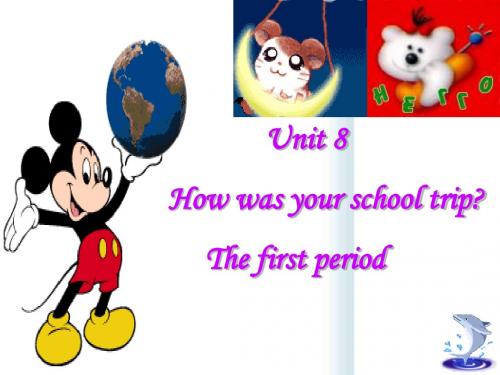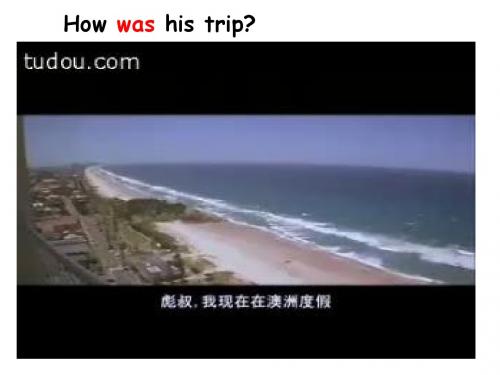How was your school trip (1)
- 格式:doc
- 大小:2.27 MB
- 文档页数:3


新目标七年级下册Unit 11 How was your school trip? 讲义一、重点单词k 挤奶2. cow .奶牛3. horse 马4. feed 喂养;饲养5. farmer 农民;农场主6. quite 相当;安全7. anything (常用于否定句或疑问句)任何东西;任何事物8. everything 一切;所有事物9. grow 种植;生长;发育10. farm 农场;务农;种田11. pick 采;摘12. excellent极好的;优秀的13. countryside 乡村;农村14. yesterday 昨天15. flower花16. worry 担心;担忧17. luckily 幸运地;好运地18. sun 太阳19. museum博物馆20. fire 火灾21. painting .油画;绘画22. exciting adj.使人兴奋的;令人激动的23. lovely可爱的24. expensive 昂贵的25. cheap 廉价的;便宜的26. slow缓慢的;迟缓的27. fast 快地(的)28. robot .机器人29. guide 导游;向导30. gift 礼物;赠品31. dark 黑暗的;昏暗的32. hear(heard)听到;听见自测表:二、短语归纳1.school trip 学校旅行2.go for a walk 去散步k a cow 给奶牛挤奶4.ride a horse 骑马5.feed chickens 喂鸡6.talk with 和......交谈7.take photos /a photo拍照st week上周9.ask some questions问一些问题10.quite a lot 相当多11.show sb. around sp.带某人参观某地12.learn about 了解13.grow strawberries种植草莓14.from...to... 从…到…15.pick some strawberries摘草莓16.take sth home带…回家17.climb the mountains 爬山18.visit my grandparents看望我的祖父母19.go fishing 去钓鱼20.so much 如此多的21.go to the zoo去动物园22.go to a farm去农场23a lot of fun很多乐趣24.play games 做游戏e out 出来26.go to the countryside去乡下27.science museum科学博物馆28.visit a museum 参观博物馆29.play chess with sb... 和…下棋30.buy sth for sb为某人买31.be interested in…对…感兴趣32.all in all总的来说33.not...at all 一点也不,根本不三、句型集萃1. How + be…? + like? ……怎么样?2. How do/does+主语+feel about...? 对......感觉如何?3. too many + 可数名词复数太多的……4.teach sb. how to do sth. 教某人怎样做某事5.quite + a / an + 形容词+可数名词单数= a + very + 形容词+可数名词单数一个相当/ 很……6.buy sth. for sb.=buy sb. Sth.为某人买东西7.It’s +形容词+to do sth. 做某事是......的8.sound+形容词听起来......四、词汇、句型讲解及拓展1.How was your school trip?学校旅行怎么样?【解析】How+be+主语?=What be+主语+like?意为“….怎么样?”★★★本句的答语:It was great./It was OK./It was/wasn’t good….【拓展】how是疑问副词,意为“怎么样,怎么”,用来构成特殊疑问句,主要用法如下:1)询问如何做某事,或者做某事方式。

初二英语Unit 8 How was your school trip? 人教版(新目标)【本讲教育信息】一. 教学内容:Unit 8 How was your school trip?一. 单元目标:1. 学习询问和谈论过去发生的事情。
2. 通过调查了解全班同学上周末的活动。
3. 通过描写“难忘的假日”,“秋游…”和日记摘抄,学习谈论过去发生的事情。
二. 语言结构:1. 规则动词和不规则动词的一般过去式。
2. 一般过去时的肯定句和否定句。
3. Did you, Were there引导的一般疑问句。
三. 重点词汇:1. aquarium n. 水族馆2. science center科学中心3. gift shop礼品商店4. seal n. 海豹5. shark n. 鲨鱼6. octopus n. 章鱼7. autograph n. 亲笔签名8. win v. 获胜,赢9. ate v. (eat的过去式)吃10. took v. (take的过去式)乘坐、花费11. hung out (hang out)外出12. got v. (get的过去式)得到13. go for a drive开车兜风14. sleep late 睡得晚15. yard sale 现场旧货出售16. day off 放假四. 重点短语:1. take photos 照相2. at the aquarium 在水族馆3. win a prize 获得奖品4. on the school trip 在学校旅行5. have a great time 玩得愉快6. watch a dolphin show 看一场海豚表演7. after that 那以后8. at the end of …在…结束在…末尾9. on the day off 在假日里10. all day 一整天11. e back from…在…回来五. 重难点解析:1. 复习一般过去时一般过去时态是谈论过去最常用的时态,它可以表示短暂而很快就完的动作和事情,时间较长的动作和状况以及重复发生的事情,句中通常有明确的一般过去时的时间状语。


Unit 11 How was your school trip?Section A【目标呈现】知识目标:词汇:gift, hang, win, prize, visitor, end, monitor, off, rain短语:hang out, sleep late, day off, have a great time, at the end of句型:1. How was your school trip?2.—Did you go to th—e zoo?—No, I didn’t. I went to the aquarium.3. —Were there any sharks?—No, there weren’t any sharks, but there were some really smart seals.语法:一般过去时的用法(一)。
能力目标:学习询问和谈论过去发生的事情。
情感目标:引导学生关注自己身边的人、事物及自然界中与我们共同生活的其他生命。
教师寄语:A good book is the best of friends, the same today and forever.一本好书,相伴一生。
【基础巩固】自主学习一、重点词汇拓展1. 逗留;徘徊____________ (过去式) ____________2. 赢;获胜____________ (过去式) ____________3. 访问者;参观者____________ (动词) ____________4. 结束;结尾____________ (动词) ____________5. 驾驶;驱车旅行____________ (过去式) ____________6. 雨;雨水____________ (过去式) ____________二、重点词组识记1. 闲荡;闲逛____________________2. 睡过头;起的晚____________________3. (因病或节假日)休息;不工作;不上学____________________4. 去水族馆_____________________5. 玩得高兴____________________6. at the end of ____________________7. take photos _____________________8. win a prize _______________________9. sound interesting ____________________10. watch a dolphin show _____________________三、重点句型体验:根据所给的图画情景和提示词,写出与图片相符的英语句子,标点符号已给出。

Unit 11 How was your school trip?Section A1. How was your trip yesterday?(1)本句为询问某事情况的常用句型,其中was是be动词的过去式,如果询问当前的情况则be动词用is。
其答语常用:It was great! (好极了) / It was OK.(还可以)/ It wasn’t good.(不好。
)/ All right.(很好。
)/ It was not bad.(还不错。
)等。
How + be+…?相当于What + be +… + like? 例如:-How was her holiday?-It was not bad.(2)How是疑问副词,意为“如何,怎样”,常用来引导特殊疑问句来询问方式、程度、状况等。
常用于以下交际用语中:1)How is/are +sb. ? 用来询问人的身体、工作、学习或生活等的状况。
例如:-How are you? -Fine, thank you.2)How is/are +sth.?用来询问某物或者某事的状况如何。
例如:How is your work?3)How do you do? 并不表示疑问,是第一次见面时的问候语,回答仍用此句。
例如:How do you do? ---How do you do?4)How is it going?/ How is everything going? 用来询问事情进展如何。
例如:How is it going? Very well./ Not too bad./just so so.2. feed chickenfeed 作及物动词,意为“喂养,饲养”,其后常接表示动物名称的词作宾语。
例如:My father’s job is to feed the animals.拓展:(1)feed..to…意为“把……喂给……吃”。
feed后接饲料或者食物名称做宾语,to为介词,其后一般接动物或者小孩等名词表示对象。
初二英语Unit 8 How was your school trip?【本讲主要内容】Unit 8 How was your school trip?通过本单元的知识学习,我们应达到以下目标:1. 掌握词汇,掌握句式,运用目标语言谈论或写出在过去发生的旅行中的感受或发表一些自己的观点想法。
2. 培养学生对生活的观察力,做生活的有心人,注重感受的能力。
学会捕捉生活中的闪光点,并将它表达给别人。
3. 掌握一般过去式。
【知识掌握】本单元的语言功能项目是“谈论过去的事情(Talk about events in the past)”。
整个单元以school trip为话题,谈论过去发生的一些事情,运用一般过去时来进行描述过去的具体情景,要求同学们掌握本单元的目标语言。
1)——Did you go to the zoo ?——Yes, I did./ No, I didn’t.2)——Were there any sharks?——No, there weren’t any sharks, but there were some smart seals.3)——What did you do on your school trip?——How was your school trip?——Where did you go ?——When did you go?——Who did you go with?【文化背景】爱度假的美国人不管在国内还是在国外(abroad),度假都是美国人娱乐、放松(relaxation)和改变生活环境的极好机会,是一家人一起过闲暇时光、相互加深了解的机会。
美国的大城市是人们旅游的热点之一。
一年到头,曼哈顿(Manhattan)的街上和酒店里都挤满了游人,他们来这里观看摩天大楼(skyscrapers)、参观博物馆和艺术画廊(art galleries)、上歌剧院(operahouses)、戏院和著名的特色商店(specialty shops)或在优雅的餐馆里就餐。
Unit11 How was your school trip?Section A 1 (1a-2d)【教学目标】1、熟悉掌握17个单词及句型2、学会谈论过去发生的事件【教学难点】1、学会17个单词2、学会谈论过去发生的事3、句型:①How was your…trip?②Did you see ...?Yes, I did. / No , I didn’t.【教学难点】1、初识一般过去式2、谈论过去的事件【教学过程】Step 1 : Warming –up1 GreetingWho is on duty today ?Who was on duty yesterday ?What is the weather like today ?What was the weather like yesterday ?2 Song : Play the song “ Old MacDonald had a farm” and have Ss find out the animals in the songGet Ss answer like this : On the farm ,there are some ducks, cats,chickens, cows pigs,dogs and horses . They are animals.Step 2 : Presentation1 Show a picture and tell Ss: This is also a farm. Last week Carol and hisclassmates had a school trip. They went to the farm. What did they do on the farm? How was their school trip?2 Show some pictures again and try to get the past tense verbs expressions according to the pictures.(1) Show the picture and the question(2) Ask one student to answer the question.(3) All students read it toghter.Q:Did he ride a horse?A:Yes, he did. He rode a horse.Q:Did he milk a cow?A:Yes, he did. He milked a cow.Q:Did he ride a horse?A :No, he didn’t .Did he feed chickens?Yes, he did. He fed chickens.Did you go to the zoo?No, I didn’t. I went to a farm.Did you see any cows ?Yes, I did. I saw quite a lot.Did they pick any strawberries on the farm ?Yes, they did .How were the strawberries?They were delicious.Were the strawberries good?Yes, they were.No, they weren’t.How was your school trip ?It was great.Were the strawberries good ?Yes ,they were.No, they weren’t.Step 3 ExercisesStep 4 : Practice (Listening and speaking)1a Match the phrses with the pictures.1b Listen and circle the three things Carol did on her school trip in 1a.1c Ask and answer questions about Carol’s school trip.2a Listen and check the questions you hear.2b Listen again.Circle T for true or F for false2c Ask and answer quest ions about Carol’s visit to the farm.Step 5 :Tasks:1 Look at the pictures and practice the dialogueA:How was your school trip?B: It was …(boring/interesting/good/great…)A:What did you do on the school trip ?B:I went for a walk with my classmates.2 2d Role-play the conversation3.Groupwork: Make a survey. Ask your partners what they didlast week. Then give a reporter.Step 6 : Grammar Focus ( Get Ss read aloud )How was your school trip ? It was great !Did you go to the zoo ? N o, I didn’t. I went to a farm.Did you see any cows ? Yes, I did. I saw quite a lot.Did Carol ride a horse ? No, she didn’t. But she milked a cow.Were the strawberries good ? Yes, they were . No, they weren’t. Step 6 Summary and Language pointsStep 7 Exercises :用be动词的适当形式填空。
Unit11 How was your school trip 要点详解How was your school trip? 重点词汇1. beat, win(1)beat指在比赛或战斗中打败某人。
意为“蠃”,此时,其宾语只能是表示人或团队的词语,不能用表示比赛、奖品等内容的词语作其宾语。
beat的反义词为lose. lose to sb. 输给某人。
(2)win表示“赢”,其宾语是表示比赛、奖品等内容的词语,不能用表示人的词语作其宾语。
win还可以作不及物动词用,后面不接宾语,表示“获胜”。
其反义词也为lose. lose sth.. 输了某事(物)。
如:He won the tennis match. 他赢得了那场网球比赛。
We are sure that we can beat them. 我们相信能战胜他们。
2. gift 礼物(1) gift用作名词,表示“礼品,礼物”时,与present同义。
Thank you for your beautiful gift. 谢谢你送给我的漂亮礼物。
(2) gift用作名词,表示“天赋,天资,才能”时,常构成短语have a gift for意为“有某方面的天赋。
如:She has a gift for music. 她有音乐天赋。
(3) gifted用作形容词,意为“有天才的,有才华的”。
如:He is a very gift person. 他是一个很有才华的人。
3. visitor 访问者,参观者,游客Millions of visitors visit the Great Wall every year.每年有数百万游客游览长城。
visitor是由“动词visit+or”构成的名词,类似的词还有actor, inventor, translator等。
思维拓展:“动词+er”构成名词,如:worker, teacher, singer等。
The teacher teaches us very well. 这位老师教我们教得非常好。
How was your school trip?教学反思教学反思
这节课上完之后有好的地方,也有一些不足之处:
快乐之一:关注全体学生
呈现新单词的时候,采取了很多有效的操练方式,全班,半班,男生,女生,group,team,row,individual等。
通过这些有序的操练,调动起所有学生的注意力。
接着是咬苹果的游戏,我和全班同学展开PK。
这个游戏需要全班同学聚精会神,有一个同学分神,全班同学的苹果都有可能会被咬一口。
教学过程中,我时刻关注着每一位学生。
快乐之二:目标重点突出
首先我将本单元的课题How was your last trip?展示在课件的边框上面,这样,每一幅画面都会呈现出这个标题。
本节课的教学重点是 The form of the past tense. 能够运用过去时谈论过去发生的事。
能够运用句型:“Did you…..? ”“were there……? ”
快乐之三:口语简洁明了将 body language 有机结合
课堂上,我总是尽力用很简单的,学生容易懂的句子和学生交流互动。
发出指令时,我总是将身体语言与我的英语指令有机结合。
力争让学生明白我的每一句指令。
快乐之四:课堂设计巧妙,课堂气氛活跃
我将每一个任务用丰富多彩的活动串了起来。
体现了玩中学和做中学的快乐教学法。
快乐之五:教学程序清晰,由浅入深层层推进。
每一步教学过程都很清晰,而且每一步都能够自然地衔接起来。
快乐之六:新颖的导入, Well begun , half down.
本节课的导入,我采用了谈话的方式,又利用我自己旅游的照片,创设了一定的情境,将学生引进 school trip 这个话题。
Do you like games? what else do you like ? 聪明的孩子一下子就帮我引人了课堂。
I like school trip 。
快乐之七:有效地呈现
A picture is worth a thousand words. 一幅图胜过千言万语,我充分利用图片呈现本节课的重点单词和短语。
我创设了一个自己去水族馆的情景,把单词放到活的语言环境里去教,激发了学生表达过去活动的欲望,生活就是知识。
遗憾之一:课堂时间和课堂节奏的调控
学生们喜欢竞争,喜欢展示自己,只恨 45 分钟太短,我没有太多时间与学生们共同感受那种游戏的欢乐。
仔细想来,除了本节课容量过大以外,我是把太多时间花在了短语和句型的操练游戏上了。
然后就是三段听力,也花了不少时间。
其实听力听过了逐题逐题检查答案就可以了的。
然后就是那个 1c 俩俩对话,我完全可以调控举手发言的次数的,每组点一对展示就可以了的。
遗憾之二:热身活动需要改进
活动应该是为本课的教学内容服务的,不应该是教学内容被活动牵着跑的。
我采用的 warm up 活动欠妥,不利于我和学生交流,尤其是借班上课。
if I begin with a "guess game",mine may go more smoothly. e.g. I should ask my students to guess “what did i do on...? ”if so,the communications between my class and me may go naturally,the next step to the point will be easy to reach. And also the practice becomes effective 。
遗憾之三:示范应该更明确些
1c 的 pair work ,我应该先出一幅图,自己找一名同学示范。
我不必示范每一幅图,其实,应该充分相信学生的潜力,课堂上总是担心他们不能,以至于耽搁了很多时间。
事实上他们能行,给他们多一些机会,多一些个性化的体验。
遗憾之四:英语指令中可以有一些汉语解释
我总是以为英语公开课上是不可以讲汉语的。
如果我的击鼓传花游戏的英语指令当中能够有一点汉语的解释或提醒,学生会更明白游戏的指令,会配合得更好,更能感受游戏的快乐。
课堂教学是充满了遗憾之美的艺术,有太多关于“如果”的思考,也会有如艺术家般渴望再创造的冲动。
我会吸取教训,在今后的课当中,努力弥补这些遗憾,凡事尽力而为,点滴过程最美!我不在乎比赛的名次,仅仅把比赛看作是一次锻炼,痛痛快快地享受比赛的过程!一次课,一次交流,一次反思,就会叠加成成功.我期待着下一次课的交流与学习。